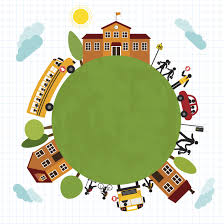Family Education
 Home-School Cooperation is crucial to child development
Home-School Cooperation is crucial to child development
‘What is home-school co-operation?’ It is the most frequently asked question by parents.
Some people may relate education to ‘schools’ and ‘teachers’, thinking that they are the providers of education. With more research done recently on this critical subject, it is time to rethink the relationship between parents and schools and how it affects children’s development. “Home’ and ‘parents’ also constitute a significant part in ‘education’. Parents and teachers both have great influence on children’s development. The connection between family and school should be strengthened so as to benefit children’s learning and development.
Schools are recognized education institutions which mainly focus on providing academic knowledge to  students. Attending schools is important to children’s development as children have to learn language skills, logical questioning techniques and other subject knowledge for them to grow intellectually. In addition, parents are also crucial to children’s growth since children spend a lot of time at home with their parents. Parents’ habits, attitudes and emotions affect their children significantly. Children tend to see their parents as role models. They imitate their parents’ behavior or the way they speak. As such, families have a vital role in educating children about appropriate manners and moral values. Some parents may not be able to teach their children the subject knowledge, but their encouragement would certainly be a strong motivation to the children. Hence, efforts from both schools and families are valuable in children’s growth and education.
students. Attending schools is important to children’s development as children have to learn language skills, logical questioning techniques and other subject knowledge for them to grow intellectually. In addition, parents are also crucial to children’s growth since children spend a lot of time at home with their parents. Parents’ habits, attitudes and emotions affect their children significantly. Children tend to see their parents as role models. They imitate their parents’ behavior or the way they speak. As such, families have a vital role in educating children about appropriate manners and moral values. Some parents may not be able to teach their children the subject knowledge, but their encouragement would certainly be a strong motivation to the children. Hence, efforts from both schools and families are valuable in children’s growth and education.
However, there are barriers in building and keeping a strong connection between schools and families.  First, tight teaching schedule of teachers constitutes a major reason for limited home-school cooperation. Teachers not only have to put in much effort preparing lessons and marking assignments. It is hard for teachers to spare enough time to communicate with all parents, so communication between schools and homes often occurs only when students experience academic or behavioural problems. Moreover, parents'' education level and their long working hours may affect their participation in school events. Some parents may not have attained a high education level, which probably makes them underestimate their role in educating their children. Parents may think that schools and teachers are mainly responsible for the academic achievement of their children and that cooperation from them is not needed. As a result, they have less motivation to communicate with schools. Home-school cooperation is also not satisfactory when parents need to work for long hours.
First, tight teaching schedule of teachers constitutes a major reason for limited home-school cooperation. Teachers not only have to put in much effort preparing lessons and marking assignments. It is hard for teachers to spare enough time to communicate with all parents, so communication between schools and homes often occurs only when students experience academic or behavioural problems. Moreover, parents'' education level and their long working hours may affect their participation in school events. Some parents may not have attained a high education level, which probably makes them underestimate their role in educating their children. Parents may think that schools and teachers are mainly responsible for the academic achievement of their children and that cooperation from them is not needed. As a result, they have less motivation to communicate with schools. Home-school cooperation is also not satisfactory when parents need to work for long hours.
In order to sort out the problem, parents are responsible for building an intimate emotional bonding with their children so they can see their home as secure base. Before they go to school, children should have learnt how to take basic care of themselves, and make their own decisions. These abilities enable children’s self-learning ability, which is the key for future development. Parents may need to consider its impact.
YMCA Christian Academy (YCA) is a unique, community-oriented private primary school situated in the heart of Hong Kong Island. It offers a broad and balanced international curriculum rooted
Read MoreSingapore’s most forward looking primary school intends to open the doors of its first kindergarten and primary school in Greater China, offering an English and Mandarin immersion programm
Read MoreSchool tours are vital during the admissions process for a child as the tours allow the parents to meet the people responsible for educating their children, observe the school’s facilities, exam
Read MoreStamford American School Hong Kong (Stamford) is a through-train school for students ages 5 to 18 where graduates can receive both an American and IB Diploma* which allows them access to top universit
Read MoreLearning a new language can always be quite intimidating and challenging in the beginning. However, it can prove to be immensely useful in the future. We provide students the opportunity to become
Read MoreWould you like to know more about your child’s English level and other abilities, whether they are from kindergarten to secondary? There is no easy task, however, our experienced cons
Read More




